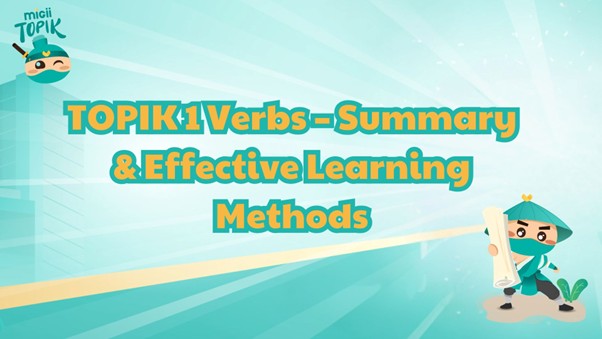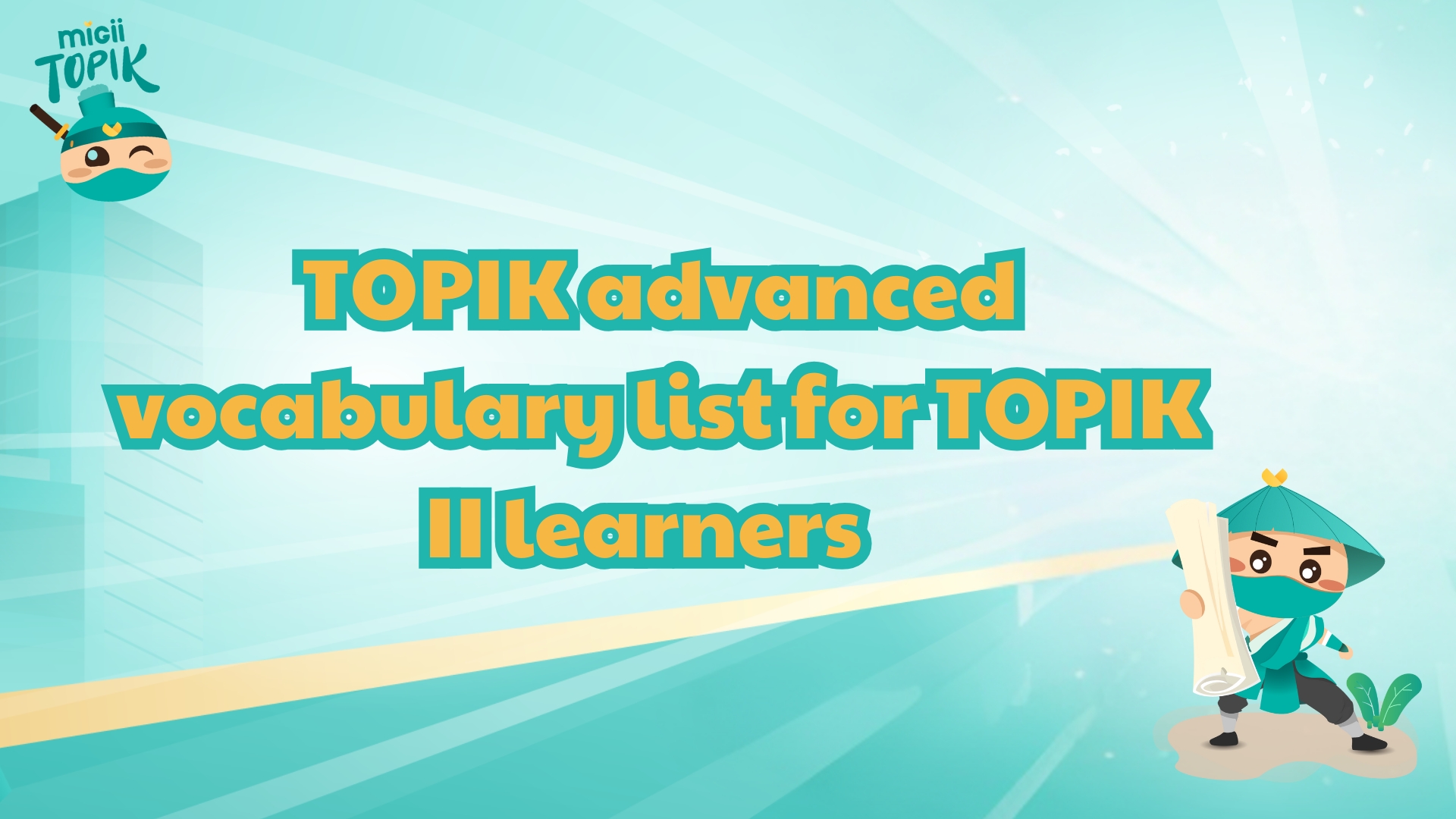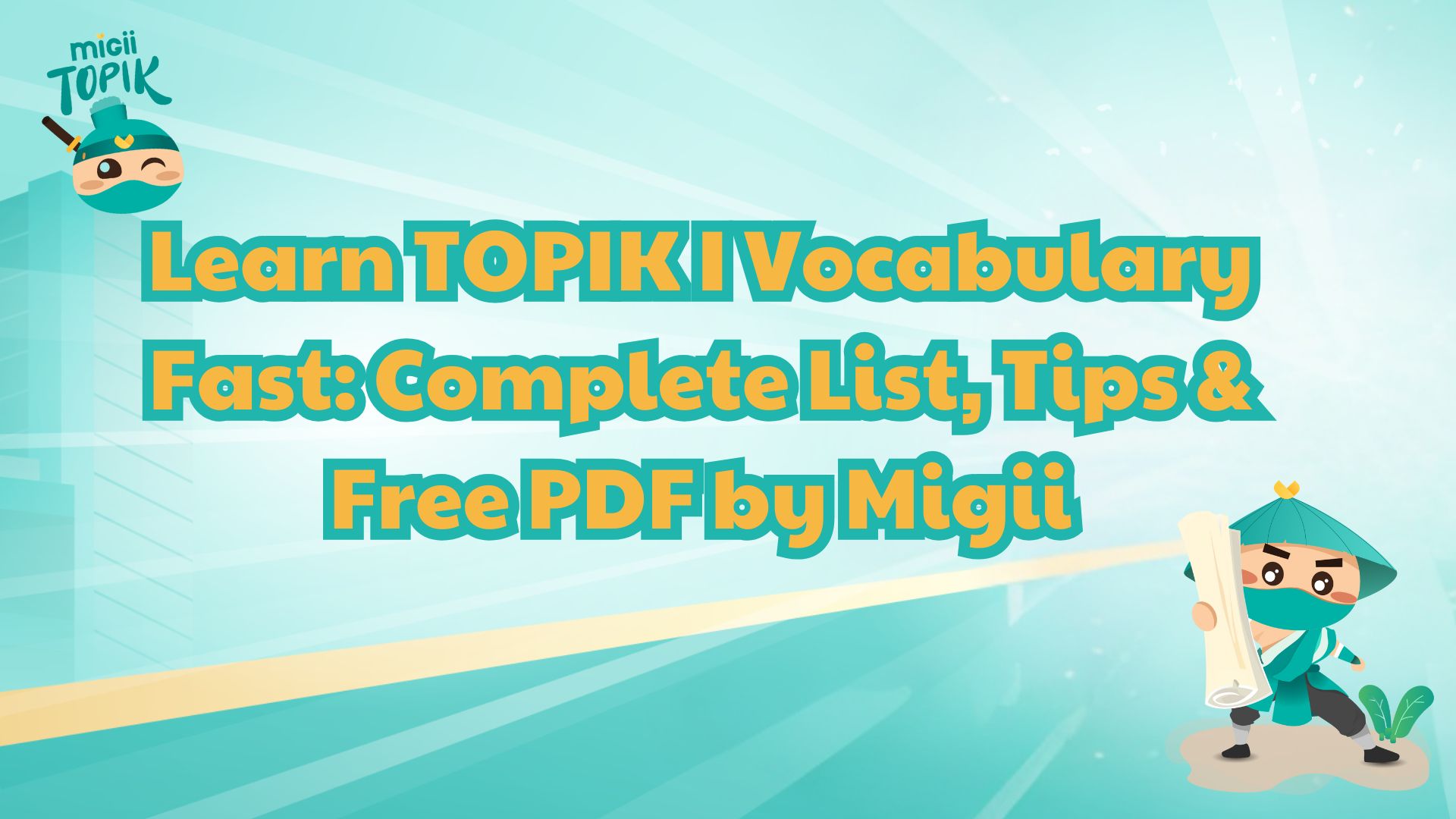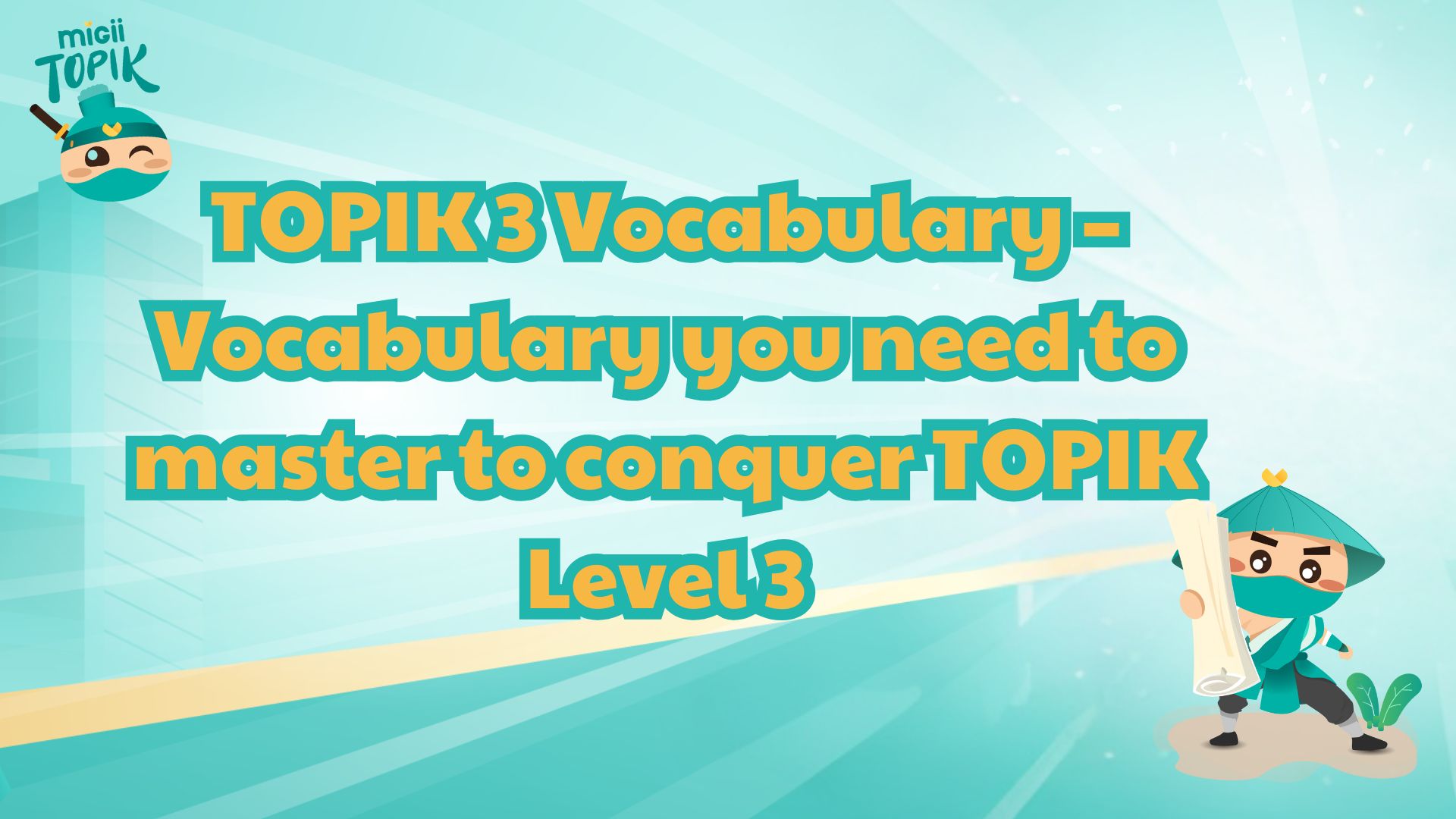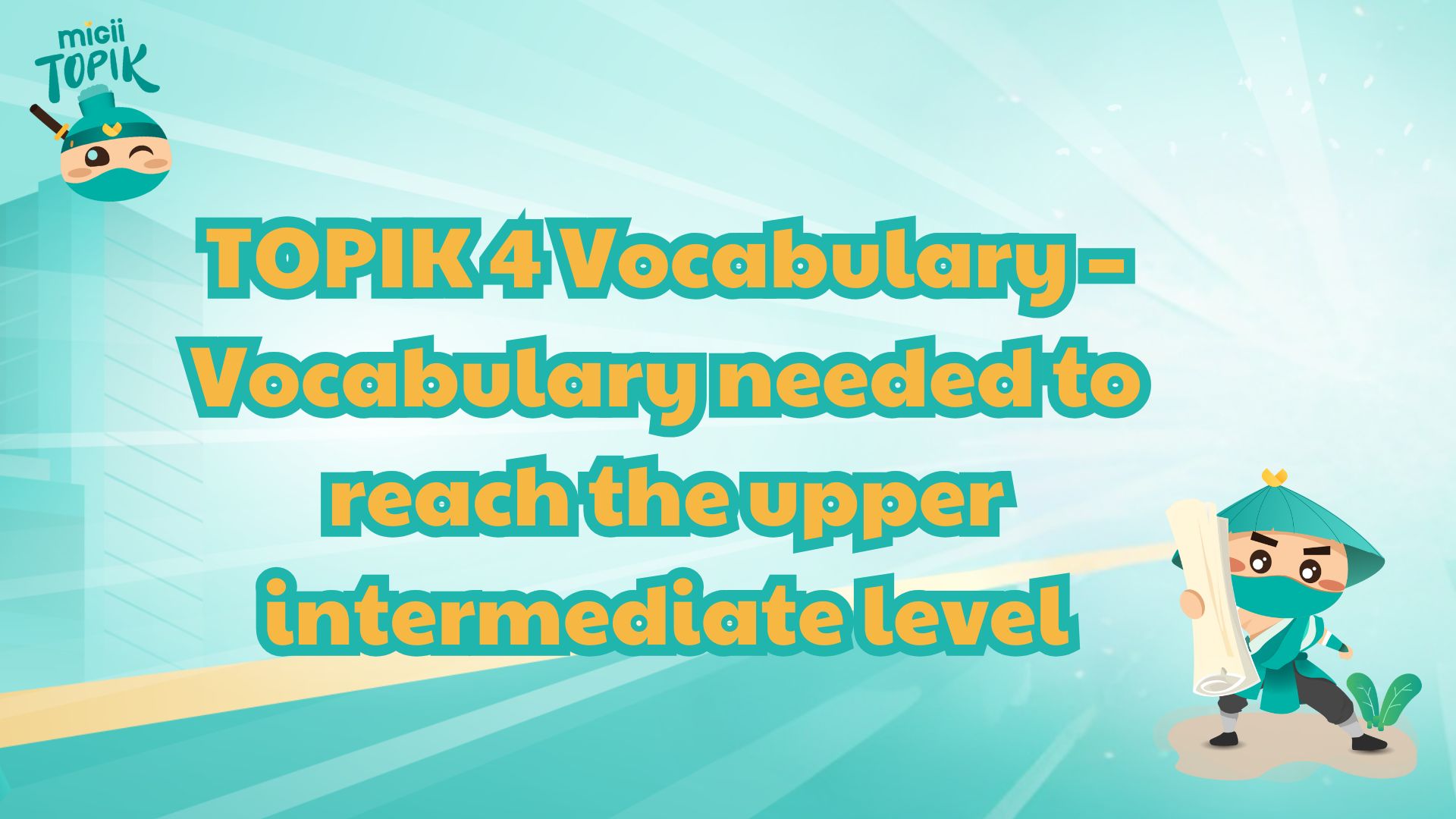The TOPIK 6000 words list is an essential resource for anyone preparing for the Test of Proficiency in Korean. It covers all key vocabulary from levels 1 to 6, helping learners build a solid foundation for reading, writing, and speaking. In this article, you’ll find sample words by level, practical study methods, and effective tools to master them faster.

TOPIK 6000 Words Vocabulary List
The TOPIK 6000 words list includes essential Korean vocabulary frequently appearing in the Test of Proficiency in Korean (TOPIK) from levels 1 to 6.
Below are selected examples from each level to help you start learning right away.
TOPIK 1 – Beginner (Common Daily Words)
|
Korean |
Romanization |
English Meaning |
Example Sentence |
|
학교 |
hak-gyo |
school |
저는 학교에 가요. (I go to school.) |
|
사람 |
sa-ram |
person |
좋은 사람이에요. (He is a good person.) |
|
음식 |
eum-sik |
food |
음식이 맛있어요. (The food is delicious.) |
|
책 |
chaek |
book |
책을 읽어요. (I read a book.) |
|
물 |
mul |
water |
물을 마셔요. (I drink water.) |
|
집 |
jip |
house |
집이 커요. (The house is big.) |
|
친구 |
chin-gu |
friend |
친구를 만나요. (I meet my friend.) |
|
날씨 |
nal-ssi |
weather |
오늘 날씨가 좋아요. (The weather is nice today.) |
|
영화 |
yeong-hwa |
movie |
영화를 봐요. (I watch a movie.) |
|
커피 |
keo-pi |
coffee |
커피를 마셔요. (I drink coffee.) |
TOPIK 2 – Elementary (Daily Life & Routine)
|
Korean |
Romanization |
English Meaning |
Example Sentence |
|
병원 |
byeong-won |
hospital |
병원에 가요. (I go to the hospital.) |
|
회사 |
hwe-sa |
company |
회사에서 일해요. (I work at a company.) |
|
시장 |
si-jang |
market |
시장이 커요. (The market is big.) |
|
은행 |
eun-haeng |
bank |
은행에서 돈을 바꿔요. (I exchange money at the bank.) |
|
약국 |
yak-guk |
pharmacy |
약국에서 약을 사요. (I buy medicine at the pharmacy.) |
|
공원 |
gong-won |
park |
공원에서 산책해요. (I take a walk in the park.) |
|
버스 |
beo-seu |
bus |
버스를 타요. (I take a bus.) |
|
시간 |
si-gan |
time |
시간이 없어요. (I don’t have time.) |
|
운동 |
un-dong |
exercise |
운동을 해요. (I exercise.) |
|
노래 |
no-rae |
song |
노래를 불러요. (I sing a song.) |
TOPIK 3 – Intermediate (Social, Work, Education)
|
Korean |
Romanization |
English Meaning |
Example Sentence |
|
직장 |
jik-jang |
workplace |
직장에서 회의를 해요. (I have a meeting at work.) |
|
경험 |
gyeong-heom |
experience |
좋은 경험이에요. (It’s a good experience.) |
|
문제 |
mun-je |
problem |
큰 문제가 없어요. (There’s no big problem.) |
|
문화 |
mun-hwa |
culture |
한국 문화가 흥미로워요. (Korean culture is interesting.) |
|
설명 |
seol-myeong |
explanation |
설명이 명확해요. (The explanation is clear.) |
|
발표 |
bal-pyo |
presentation |
발표를 준비해요. (I prepare a presentation.) |
|
방법 |
bang-beop |
method |
좋은 방법이에요. (That’s a good method.) |
|
관심 |
gwan-sim |
interest |
한국어에 관심이 많아요. (I’m interested in Korean.) |
|
노력 |
no-ryeok |
effort |
노력이 필요해요. (Effort is needed.) |
|
선택 |
seon-taek |
choice |
올바른 선택이에요. (It’s the right choice.) |
TOPIK 4 – Upper Intermediate (Academic & Abstract Vocabulary)
|
Korean |
Romanization |
English Meaning |
Example Sentence |
|
사회 |
sa-hwe |
society |
현대 사회의 변화가 빠르다. (Modern society changes fast.) |
|
경제 |
gyeong-je |
economy |
한국 경제가 발전하고 있다. (The Korean economy is developing.) |
|
환경 |
hwan-gyeong |
environment |
환경 보호가 중요하다. (Environmental protection is important.) |
|
정부 |
jeong-bu |
government |
정부 정책을 발표했다. (The government announced a policy.) |
|
기술 |
gi-sul |
technology |
기술이 발전하고 있다. (Technology is advancing.) |
|
결과 |
gyeol-gwa |
result |
좋은 결과를 얻었다. (Got a good result.) |
|
기준 |
gi-jun |
standard |
기준을 세우다. (Set a standard.) |
|
영향 |
yeong-hyang |
influence |
부모의 영향이 크다. (Parental influence is large.) |
|
자료 |
ja-ryo |
data |
자료를 정리하다. (Organize data.) |
|
목표 |
mok-pyo |
goal |
목표를 달성하다. (Achieve a goal.) |
TOPIK 5 – Advanced (Professional & Abstract Concepts)
|
Korean |
Romanization |
English Meaning |
Example Sentence |
|
인식 |
in-sik |
awareness |
사회적 인식이 변하고 있다. (Public awareness is changing.) |
|
경쟁 |
gyeong-jaeng |
competition |
치열한 경쟁이 있다. (There is fierce competition.) |
|
분석 |
bun-seok |
analysis |
데이터를 분석하다. (Analyze data.) |
|
지원 |
ji-won |
application/support |
회사를 지원하다. (Apply for a company.) |
|
판단 |
pan-dan |
judgment |
올바른 판단을 내리다. (Make the right judgment.) |
|
대책 |
dae-chaek |
countermeasure |
새로운 대책이 필요하다. (New measures are needed.) |
|
절차 |
jeol-cha |
procedure |
절차를 따르다. (Follow procedures.) |
|
협력 |
hyeob-ryeok |
cooperation |
국제 협력이 중요하다. (International cooperation is important.) |
|
원인 |
won-in |
cause |
사고의 원인을 조사하다. (Investigate the cause of an accident.) |
|
한계 |
han-gye |
limit |
능력의 한계를 느끼다. (Feel the limit of ability.) |
TOPIK 6 – Advanced Academic / Literary Vocabulary
|
Korean |
Romanization |
English Meaning |
Example Sentence |
|
논의 |
non-ui |
discussion |
논의를 계속하다. (Continue the discussion.) |
|
제안 |
je-an |
proposal |
제안을 수락하다. (Accept a proposal.) |
|
통계 |
tong-gye |
statistics |
통계를 분석하다. (Analyze statistics.) |
|
비율 |
bi-yul |
ratio |
높은 비율을 차지하다. (Occupy a high ratio.) |
|
현상 |
hyeon-sang |
phenomenon |
자연 현상을 연구하다. (Study natural phenomena.) |
|
정책 |
jeong-chaek |
policy |
새로운 정책을 시행하다. (Implement a new policy.) |
|
제도 |
je-do |
system |
교육 제도를 개편하다. (Reform the education system.) |
|
관점 |
gwan-jeom |
perspective |
다양한 관점에서 보다. (View from various perspectives.) |
|
가치 |
ga-chi |
value |
인생의 가치를 생각하다. (Think about life’s value.) |
|
표현 |
pyo-hyeon |
expression |
감정을 표현하다. (Express feelings.) |
You can access the complete TOPIK 6000 Words Vocabulary List (PDF & Excel) divided by level and topic for detailed study.
Download here:
Effective Methods to Master the 6000 Vocabulary Words
Learning 6000 Korean vocabulary words for the TOPIK exam may seem challenging at first. However, with the right learning approach, you can memorize and apply them effectively. Instead of focusing only on rote memorization, learners should study vocabulary in context, use digital tools strategically, and practice applying new words in real exam settings.
Contextual and Thematic Learning
A proven way to memorize a large vocabulary set is to study words in context or by topic rather than in isolation. When words are grouped thematically, they become easier to remember and apply naturally in sentences.
For instance, you can organize vocabulary into specific themes:
- Environment: 환경 (environment), 오염 (pollution), 보호 (protection), 재활용 (recycling)
- Politics: 정부 (government), 정책 (policy), 국민 (citizen), 선거 (election)
- Technology: 기술 (technology), 인터넷 (internet), 인공지능 (artificial intelligence), 데이터 (data)
This method helps learners make meaningful associations. Instead of memorizing translations, you understand how each word functions in real contexts. Reading short Korean articles or dialogues centered on a single topic is a practical way to reinforce vocabulary naturally.
A useful tip is to write a short paragraph or diary entry using 10–15 words from the same topic. This habit not only strengthens recall but also improves your writing performance in the TOPIK exam.
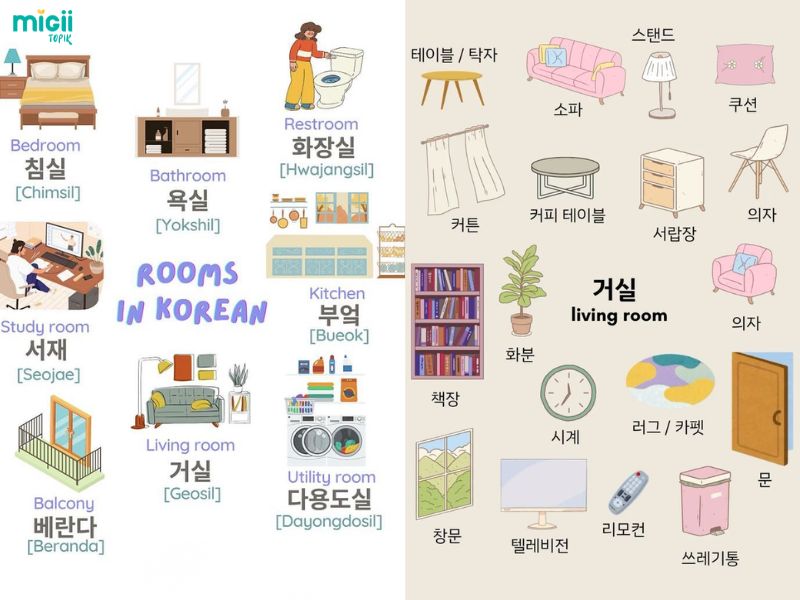
Learn Korean vocabulary by topic for better memory and natural sentence use
Utilizing Flashcard Tools and Spaced Repetition
One of the most effective ways to memorize thousands of vocabulary words is by using flashcards together with spaced repetition. This method allows you to review words at carefully timed intervals, just before you are likely to forget them, which helps strengthen long-term memory and improve recall speed.
To begin, create your own flashcards for each new word, including:
- The Korean word and its meaning
- Romanization (pronunciation guide)
- One short example sentence
Review your flashcards every day for about 20 - 30 minutes. What matters most is staying consistent. Short, focused study sessions are usually much more effective than long but irregular periods of review.
Many learners also use digital platforms that automate this process. Flashcard tools available on apps and websites can track your learning progress and adjust review schedules automatically. For example, the Migii app offers spaced-repetition study modes tailored to the TOPIK 6000 word list, allowing you to practice vocabulary systematically and test your memory through interactive quizzes.
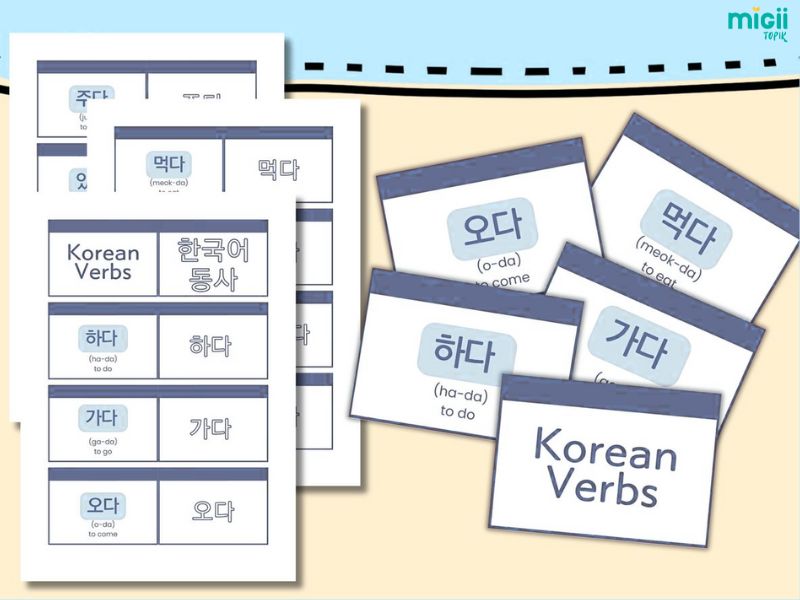
Learn Korean words faster with flashcards and spaced repetition
Applying Vocabulary in Exam Scenarios
Memorizing vocabulary alone isn’t enough. To truly master the 6000 words, you must learn to apply them strategically in the Reading and Writing sections of the TOPIK II exam.
In the Reading section:
- Read past papers or sample passages and underline unfamiliar words.
- Try to infer their meanings from context before checking the dictionary.
- Focus on formal or academic expressions that often appear in passages, such as 사회적 문제 (social issue) or 경제 성장 (economic growth).
- Observe how advanced words are used in various sentence structures to understand nuance.
In the Writing section:
Integrate higher-level vocabulary naturally into your essays.
Replace simple words with academic alternatives:
- 좋다 (good) → 유익하다 (beneficial)
- 문제 (problem) → 과제 / 이슈 (issue / task)
- 도와주다 (help) → 지원하다 (support)
Learn to use transitional connectors such as 따라서 (therefore), 반면에 (on the other hand), and 게다가 (in addition) to improve logical flow.
A practical exercise is to take one past essay topic and rewrite your answer using 15 – 20 advanced words from your vocabulary list. This method strengthens recall and prepares you for real exam situations.

Apply advanced Korean vocabulary effectively in the TOPIK exam
Frequently Asked Questions
1. How long does it take to learn 6000 words?
It depends on your pace and study routine. With consistent effort, most learners can master the full list in about six to twelve months.
2. Will knowing 6000 words guarantee TOPIK 6?
Not entirely. A strong vocabulary is essential, but you also need good grammar, reading, listening, and writing practice to reach the highest level.
3. Where can I find study materials?
You can use TOPIK vocabulary books, online resources, or learning platforms such as the Migii app and website for structured study and test practice.
Conclusion
Mastering the TOPIK 6000 words is one of the most effective ways to improve your Korean proficiency and prepare for higher TOPIK levels. By learning vocabulary in context, reviewing consistently, and applying it through real exam practice, you can strengthen both your memory and language skills. To make your study more structured and efficient, you can use the Migii app or website to access the full TOPIK word list, take practice tests, and review with smart learning tools that help you progress faster.


